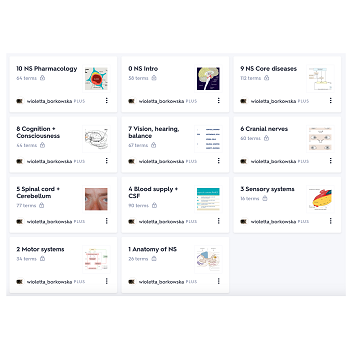
Hi, I’m Violet, I’m a third-year medical student intercalating in Surgical Sciences. Today I’d like to share some of my study methods, and how they changed over time, to give you (I hope) an idea of what works and what probably doesn’t.
A little disclaimer from me
The below methods are very personal to me. Although I believe they can work for a lot of other medical students, they might not – and if they don’t, my apologies! Everyone is different 🙂
Stick to a study schedule
First things first, I can’t stress enough how important it is to have regular study sessions. There are many fewer teaching hours at university as compared to school, but this doesn’t equal less learning (quite the opposite!). And to do well, you need to kind of self-organise those extra teaching hours (at least that’s how I like to think about it).
It doesn’t have to mean planning every single minute of your time! I’d say you’re doing just fine if you’re able to stick to your study schedule in 70-80% of the time. Plans change, unexpected things happen – it’s better to allow for that than to stress over not doing the exact number of study sessions you planned to do.
For some people, timekeeping is of crucial importance when studying – it helps them to focus, be more productive and organised. For that, you can use things like an online Pomodoro Timer (work for 25 minutes, take a 5 minute break) or an app resembling it, for instance, the Forest app. Personally, I didn’t find these that helpful as it stresses me to remember to set the timer. I also don’t find it particularly soothing when I see a tree dying on my phone screen (in the Forest app). But you might try it and see for yourself.
Know your curriculum
The better you know what you’re supposed to know, the higher your chances of being well-prepared – that should go without saying. On Learn you’ll find the Learning Outcomes for each module – before starting your revision, be sure to go through all of them. And don’t let LO’s you’ve never heard about upset you – c’est la vie, that’s how universities work…
Use active recall

Rereading, highlighting, summarising, and making nice notes – these are the classical study methods – but they’re time-consuming and probably not-as-effective. Research shows it’s active recall that does the trick the best. By using active recall, you proceed straight to strengthening nerve connections that encode particular information in your brain. And that’s exactly what you want.
There are many ways to learn using active recall, and these include taking practice tests or asking yourself lots of questions. I prefer the latter (partly because of lack of past papers). I convert all the relevant lecture material into Quizlet flashcards (Anki is also an excellent alternative), and et voilà, I quiz myself.
Some active recall enthusiasts even propose we should write questions only and not bother to write an answer. Their rationale is that it takes too much time, and information is so accessible these days that we can always look it up somewhere. Though I’m a bit afraid of taking active recall to this level, it fascinates me so much that I’ll give it a go at some point.
Another thing that helps with active recall are diagrams, particularly if self-made. I’m not a huge fan of typical hand-written spider diagrams, or at least I’ve tried using them, and they didn’t work out for me. But it helps me learn if I create a concise and well-organised diagram in an app like Draw.io. I can then print it off and hang it somewhere visible. I’ve noticed that later when I have to remember the diagram, I do it pretty well.
The last thing I’d like to mention here are flashcards made with the use of PowerPoint slides. That’s yet another method I gave a go. Although I’m not sure if I’ll continue with it, I can see how it can be efficient for some people.
The idea here is to have one PowerPoint slide for each piece of information you want to learn. Such slides have some advantages over regular online flashcards – text format and arrangement can be whatever you want it to be, and you can add images in any shape or form, too. It might be a good option for those who are visual learners.
Use spaced repetition
The more you practice, the better you become, and there seems to be no way around it. Like with active recall, spaced repetition is again backed by a lot of evidence from antiquity to present day, and again flashcard apps will come in handy here. Many of them have a built-in feature of spaced repetition (for example Quizlet Plus, which I use, and Anki), which makes life so much easier.
If you don’t like using flashcards or if your app doesn’t support spaced repetition, worry not, you can still implement it in your learning as long as you develop some smart repetition schedule.
Be careful with revision plans
Don’t create ambitious revision plans, especially for the period right before an exam. I was guilty of this so many times, and it cost me a LOT of nerves, just because I kept falling behind with each plan I created. I concluded that (however crazy it sounds), it might be better not to have a revision plan at all.
What I have instead is more of a ‘revision hierarchy’. First, I focus on important topics that I don’t quite get, then on important topics I get, and at the end, at less important topics I don’t get and get if that makes sense?
It makes me a lot calmer, especially if I think about the Pareto Principle, which says that 80% of the results come from 20% of the input. In that way, I know that if I first learn 20% of important content well, I’ll already have good chances for a decent score. Then I can peacefully work on learning more details and (possibly) improving my score.
Last but not least, it might be useful to keep some retrospective record of what and when you’ve been revising so far. In this way, you can see which topics you haven’t studied enough times and hence might be worth another look.
I hope this has been a useful read and you’ll be able to take something out of it. Good luck with all the exams and studying everyone!


